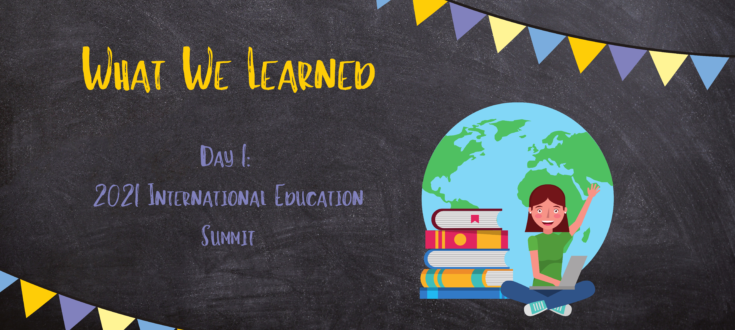What We Learned on Day 1 of IES 2021: Your Future in the World

This year marks our 15th year of the annual International Education Summit, and even though we pivoted to a virtual event again this year, that didn’t stop us from learning from our amazing community. We kicked things off on Thursday, October 21st with four sessions connected to this year’s theme: Your Future in the World. All of these sessions allowed us to reflect on what it means to increase global citizenship and cultural competency in our region, and we wanted to share some of those reflections.
After the world was turned upside down in 2020, we knew we wanted to give students a greater voice in our programming. At the end of last year’s summit, focused on Peace and Justice, we sent students a survey to ask their opinions on what they felt would most affect their futures. While many students said the COVID-19 pandemic would impact them, students also mentioned issues like climate change, economic challenges, and racial injustice. When asked about which foreign policy relationships would be most critical to the United States, the majority of students chose China, followed by Russia, North Korea, and Afghanistan. It’s clear that students are keeping up with current events and are eager for ways in which they can help develop solutions to these global challenges.
In our kickoff to the 2021 summit, The Value of Global Competence: Views from Young Professionals, Advisory board member and longtime friend of the World Affairs Council of Cincinnati and Northern Kentucky Deborah Schultz moderated a panel discussion featuring four young professionals reflecting on their careers and the value of international experience and cultural awareness. Some panelists, like Thomas Schultz of Green Umbrella and Dave Crookham of Marine for Life, spoke of serving overseas with the Peace Corps and the Marine Corps and how that impacted their worldviews. Lindley Winchester of Amazon and Meagan Hawkins of The Chertoff Group also shared insights for students when it comes to choosing a career and gaining experience. While all of our panelists now work stateside, they reflected on how an awareness of international issues and cultures aided their careers. We appreciate the words of wisdom they shared for our students.
At noon, we took a working lunch break for a brief Flash Chat with Consul General Wolfgang Moessinger of Germany. Consul General Moessinger works out of the Chicago consulate and addresses US-German relations for the Midwestern United States. Moessinger shared Germany’s economic challenges coming out of the COVID-19 pandemic as well as the federal elections held in Germany back in September. He acknowledged that the new coalition government that will be formed will need to tackle long-term goals such as economic growth and reducing the effects of climate change. Cincinnati has a rich German heritage and it’s always a pleasure to have Consul General Moessinger speak with our council.
At 4pm we had a further discussion on the effects of the COVID-19 pandemic, focusing on food. In Food is Essential: Examining COVID’s Impact on the Global Supply Chain and Food Insecurity, we discussed the ways in which grocers, restaurants, and food distributors have had to adapt to fluctuations in supply and demand. Joining us for this panel discussion was Sean Brislin of Kroger, Suzy DeYoung of La Soupe, and Michael Truitt of the Freestore Foodbank. Brislin and Truitt discussed how labor shortages and a fluctuation in petroleum prices, needed for transportation and product packaging, have led to increased prices and tightened supply chains for the products they need for their clients and customers. Truitt also discussed how the way in which the Freestore Foodbank distributes their product to pantries and those in need in the community has shifted as a result of serving in a lockdown. Brislin noted that before COVID most food was consumed away from home but that changed almost overnight when lockdowns went into place. While this may have been a benefit to Kroger, DeYoung noted that the restaurant industry took a significant hit. She noted that La Soupe’s Community Kitchen program was a direct response to this need and worked to rescue food that would’ve gone to waste from these restaurants and transform them into healthy meals for individuals facing food insecurity. La Soupe employed restaurant chefs and their staff from over 23 restaurants so they could earn wages during the lockdown and help the restaurants stay afloat. Both Truitt and DeYoung noted that students and members of the community can help the Freestore Foodbank and La Soupe in their missions by volunteering with their organizations and programs.
Our friends from the World Affairs Council of Northwest Ohio presented the day’s final session, Languages Equal Opportunity: Language and Culture Career Exploration. Dr. Linda Rouillard, Chair of the Department of World Languages and Cultures at the University of Toledo moderated this panel and spoke about the importance of learning a foreign language. She noted that immersing yourself in a culture is the best way to learn a language, such as studying abroad. She also noted that many countries host exchanges for young professionals who would like to live abroad and teach English overseas. Wendi Howell from the Ohio Department of Development discussed the Ohio Export Internship Program, where the state partners with Ohio businesses that sell their products and services overseas to provide a college intern who is fluent in a needed foreign language to assist the business with their operations. Businesses are reimbursed for 50% of the intern’s wages by the state and the student benefits from learning business acumen and practicing their language skills in an authentic environment. Tyler Easton, student at Ashland University, shared his experience interning with SecuraStock as part of this program and how he was able to learn new skills and translate important information for the company’s clients. Lance Erickson, former director of the Center for Slavic and East European Studies at Ohio State University, discussed how language and cultural understanding has led to his long career in academia and in his current role with the Department of State. Erickson discussed the importance of critical languages to US diplomatic efforts, as his knowledge of Russian has opened many doors for his career. Like Rouillard, Erickson also mentioned the importance of fully immersing oneself in a culture, sharing an anecdote of how sharing the poetry of Alexander Pushkin allowed him to better connect with the locals he was working with. We are so grateful to Bill Hilt, president of the World Affairs Council of Northwest Ohio, for putting together this amazing panel.
We’ve recorded all four of these conversations in case you missed them. View recordings on our Facebook page, YouTube channel, or on the summit We hope that you’ll share them with others. If you want to use the videos and resources in the classroom or for your organization and have further questions, feel free to contact me at elundstedt@cincyworldaffairs.org. Thanks to everyone who attended Day 1 and we hope to see you for Part 2 on November 3rd and 4th!


